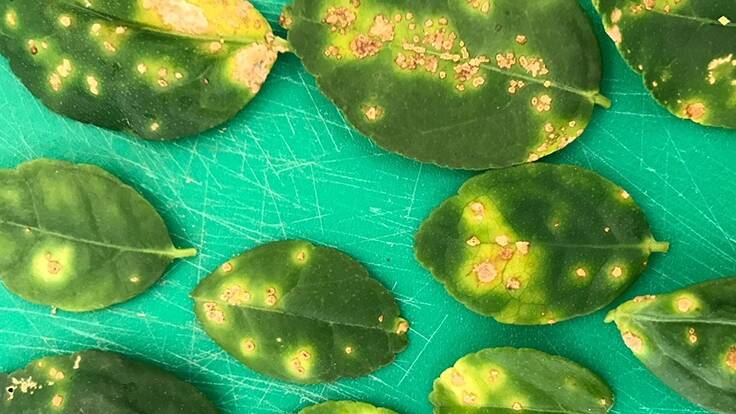
There are growing calls for all citrus plants in the NT to be quarantined as a citrus canker disease starts to spread.
Subscribe now for unlimited access.
$0/
(min cost $0)
or signup to continue reading
At least one state, NSW, has ordered a temporary ban on all citrus produced in the NT.
The NT Government has today gazetted new restrictions to control the spread of citrus canker.
The restrictions apply to the movement of a list of potential citrus canker host plants and any parts of those plants.
Today the NT gazetted special restrictions on the movement of host plants in order to contain the spread of citrus canker.
The control area covers the greater Darwin area and beyond, south to Adelaide River, east to Kakadu and west to Dundee.
Plants susceptible to citrus canker, and products such as fruit and leaves, are not allowed out of this area.
In addition, six restricted areas have been declared around properties found to have infected plants:
None of these areas are in the Katherine region.
The response comes as at the NT is linked to the spread of the disease into WA – at Kununurra and Wyndham.
These plants cannot be moved into, out of, or within the restricted areas. Propagation of these plants is also prohibited in the restricted areas.
Currently restricted areas have been declared around sites where plants infected with citrus canker have been detected:
- · Airport Restricted Area
- · Lambells Lagoon Restricted Area
- · Humpty Doo Restricted Area
- · Woolner Restricted Area
- · Wulagi Restricted Area, and
- · Palmerston Restricted Area
A wider Control Area has also been established over the whole of the greater Darwin area and beyond, south to Adelaide River, east to Kakadu and west to Dundee, from which citrus plants cannot be removed.
The restrictions do not apply to citrus fruit or juice from outside the control area such as those purchased in major supermarkets or most other retail outlets.
The Department of Primary Industry and Resources (DPIR) Chief Plant Health Officer Sarah Corcoran said this strict quarantine around infected plants was necessary to ensure we controlled the spread of the disease.
“Citrus canker has been eradicated in Australia before through the use of similar movement restrictions and surveillance arrangements as have been announced today – with cooperation we can get rid of it again,” she said.
“If you live or work in the restricted areas announced today, we ask that you cooperate with response staff who will be undertaking visits as part of the testing and eradication effort.
“All Territorians can contribute to the effort by not moving any citrus plants and contacting the department if you think you have a plant that may be infected with the disease.”
DPIR continues to work closely with industry and the community on the response to manage the risk of citrus canker and to eradicate the disease.
To find out if your home or workplace is included in one of the restricted areas please see the detailed maps and a list of affected plant species online at https://dpir.nt.gov.au/citrus-canker
Restrictions that prohibit the movement of NT citrus interstate remain in place.
If you think you have a plant with citrus canker you can submit your photos and contact details via the new online form https://dpir.nt.gov.au/citrus-canker or contact the citrus canker hotline on 1800 931 722 or email citruscanker@nt.gov.au


